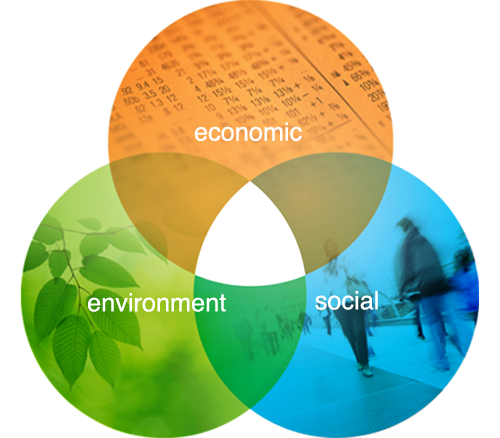The definition of Sustainability
Sustainability or Sustainable Development is often defined by the 1987 Brundtland’s Commission of the United Nations:
"Sustainable development is development that meets the needs of the present without compromising the ability of future generations to meet their own needs."
Since then the Sustainability movement has progressed and taken a new form in order to promote inclusion of the many stakeholders involved in facilitating a functioning planet and home for human beings. In a modern context, sustainability is the intersection of environmentalists, humanitarians and economists. Sustainability consists of three primary aspects which must be fulfilled to ensure equality. These three aspects, social, environmental, and economic, were coined the 3 pillars of sustainability by the World Summit on Social Development (2005).
Nowadays almost every company, government or global organization is discussing how we should strive for sustainability. With all its popularity nevertheless it remains uncertain: Is sustainability achievable or is it rather an aspiration? Regardless of your beliefs, most agree that some form of sustainable development is necessary to insure a livable future.
Environmental Sustainability
Environmental sustainability involves the maintenance and protection of natural capital. Natural capital are natural resources that can provide ecosystem services such as fresh air, a stabilized climate, rich soils, filtered water, erosion protection, wave barriers, healthy fisheries and wildlife, recreation and tourism, etc. The use of natural capital must be rational and sustainable so that it can also be enjoyed and profited from by future generations. Overall we should aim to minimize our ecological footprint in order to improve our social, cultural and economic well-being.
Social & Economic Sustainability
Social or cultural sustainability aims to promote sustainable development for communities and encourage social interaction, diversity and equality in access to resources for all people. This involves ensuring basic human rights, such as gender equality, inclusion and tolerance, eradication of hunger, basic sanitation, access to education and healthcare, cultural freedoms and improved quality of life. For successful social sustainability it also means that all stakeholders are involved or considered during decision making. To achieve social sustainability it is vital to have a healthy functioning built and natural environment.
Economic sustainability involves the creative use of economic resources to ensure a balance in social and natural environments all while promoting economic development. Economic capital should be utilized strategically to accomplish the goals of the community and as a means to sustain the other pillars.


